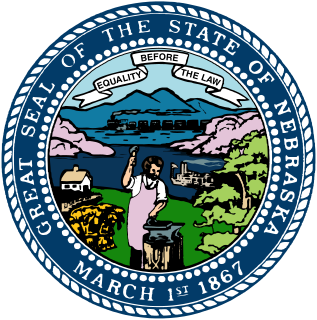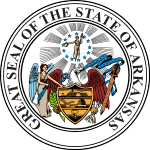Elections to choose members of the North Carolina Council of State were held on Tuesday, November 2, 2004.
The 2006 Texas General Election was held on Tuesday, 7 November 2006, in the U.S. state of Texas. Voters statewide elected the Governor, Lieutenant Governor, Attorney General, Comptroller of Public Accounts, Commissioner of the General Land Office, Commissioner of Agriculture, and one Railroad Commissioner. Statewide judicial offices up for election were the chief justice and four justices of the Texas Supreme Court, and the presiding judge and two judges of the Texas Court of Criminal Appeals.
Oregon's 2006 statewide election included a May 16 primary election and a November 7 general election.
The Green Party of Arkansas is the state party organization for Arkansas of the Green Party of the United States.
One justice of the North Carolina Supreme Court and six judges of the North Carolina Court of Appeals were elected to eight-year terms by North Carolina voters on November 4, 2008. This coincided with the presidential, U.S. Senate, U.S. House, gubernatorial, and Council of State elections.

The 2007 Kentucky elections for the statewide offices of governor, lieutenant governor, attorney general, auditor of public accounts, commissioner of agriculture, secretary of state, and state treasurer were held on November 6, 2007. All incumbents were reelected with the exception of incumbent governor Ernie Fletcher, who was defeated in his reelection bid for governor by former Lieutenant Governor Steve Beshear. In addition, Democrats held the open Attorney General and State Treasurer posts.
One justice of the North Carolina Supreme Court and five judges of the North Carolina Court of Appeals were elected by North Carolina voters on November 2, 2010, on the same day as the U.S. Senate election, U.S. House elections, and other state-level elections. North Carolina judicial elections are non-partisan. Terms for seats on each court are eight years. All incumbent judges and justices who sought re-election won their respective races, except for Judge Cressie Thigpen of the Court of Appeals, who had been appointed shortly before the election and lost North Carolina's first statewide election to use Instant-runoff voting.
Several justices of the North Carolina Supreme Court and judges of the North Carolina Court of Appeals were elected to eight-year terms by North Carolina voters on November 5, 2002. Party primary elections were held on Sept. 10. This was the last year in which statewide judicial elections were partisan.

The Ohio general elections, 2010 were held on November 2, 2010 throughout Ohio. Primary elections took place on May 4, 2010.

Elections were held in Nebraska on November 2, 2010. Primary elections for the Republican Party and Democratic Party, as well as a nonpartisan primary for members of the Nebraska Legislature, took place on May 11, 2010.

Arkansas's 2010 general elections were held November 2, 2010. Primaries were held May 18, 2010 and runoffs, if necessary, were held November 23, 2010. Arkansas elected seven constitutional officers, 17 of 35 state senate seats, all 100 house seats and 28 district prosecuting attorneys, and voted on one constitutional amendment and one referred question. Non-partisan judicial elections were held the same day as the party primaries for four Supreme Court justices, four appeals circuit court judges, and eight district court judges.
The 2010 Georgia statewide elections were held on November 2, 2010 in the U.S. state of Georgia. The primary elections were held on July 20. Primary contests in which no single candidate received a majority of the vote were decided in a runoff election on August 10.
Elections for state and federal offices for the 2010 election cycle in Connecticut were held on Tuesday, November 2, 2010. Any necessary primary elections for the Republican and Democratic parties were held on Tuesday, August 10, 2010.

Elections were held in Alabama on Tuesday, November 2, 2010. Primary elections were held on June 1, 2010 with the run-off on July 13.

Louisiana's 2011 state elections were held on October 22, 2011, with runoff elections held on November 19. All statewide elected offices were up, as well as all seats in the Louisiana State Legislature.
The North Carolina Council of State elections of 2012 were held November 6, 2012 to select the nine officers of the North Carolina Council of State. This election coincided with the U.S. presidential election, U.S. House elections, the gubernatorial election and the statewide judicial elections. Primary elections were held on May 8, 2012; for races in which no candidate received 40 percent of the vote in the primary, runoff elections were held on July 17.

A general election was held in the U.S. state of Arkansas on November 4, 2014. All of Arkansas' executive officers were up for election as well as a United States Senate seat, and all of Arkansas' four seats in the United States House of Representatives. Primary elections were held on May 20, 2014 for offices that need to nominate candidates. Primary runoffs, necessary if no candidate wins a majority of the vote, were held on June 10, 2014.
James Ratliff is an American politician and a former Democratic member of the Arkansas House of Representatives. Ratliff represented District 60 between January 2013-January 2017 and District 73 from January 2011 until January 14, 2013.
Robert Smith Moore Jr. is an American farmer and politician. He was a member of the Arkansas House of Representatives, serving from 2007 to 2013. He is a member of the Democratic party.

North Dakota held two statewide elections in 2018: a primary election on Tuesday, June 12, and a general election on Tuesday, November 6. In addition, each township elected officers on Tuesday, March 20, and each school district held their elections on a date of their choosing between April 1 and June 30.













